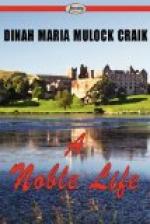“But we maun hae grand doings this time, ye ken,” said an old farmer to the minister, “for I doubt there’ll ne’er be anither Earl o’ Cairnforth.”
Which fact every one seemed sorrowfully to recognize. It was not only probable, but right, that in this Lord Cairnforth—so terribly afflicted—the long line should end.
As the day of the earl’s majority approached, the minister’s feelings were of such a mingled kind that he shrank from these demonstrations of joy, and rather repressed the warm loyalty which was springing up every where toward the young man. But after taking counsel with Helen, who saw into things a little deeper than he did, Mr. Cardross decided that it was better all should be done exactly as if the present lord were not different from his forefathers, and that he should be helped both to act and to feel as like other people as possible.
Therefore, on a bright June morning, as bright as that of his sad birth-day and his mother’s death-day, twenty-one years before, the earl awoke to the sound of music playing—if the national pipes of the peninsula could be called music—underneath his window, and heard his good neighbors from the clachan, young and old, men, women, and bairns, uniting their voices in one hearty shout, wishing “A lang life and a merry ane” to the Earl of Cairnforth.
Whether or not the young man’s heart echoed the wish, who could tell? It was among the solemn secrets which every human soul has to keep and ever must keep between itself and its Maker.
Very soon the earl appeared out of doors, wheeling himself along the terrace in his little chair, answering smilingly the congratulations of every body, and evidently enjoying the pleasant morning, the sunshine, and the scent of the flowers in what was still called “The countess’s garden.” People notice afterward how very like he looked that day to his beautiful mother; and many a mother out of the clachan, who remembered the lady’s face still, and how, during her few brief months of married happiness and hope, she used to stop her pretty pony-carriage to notice every poor woman’s baby she chanced to pass—many of these now regarded pitifully and tenderly her only son, the last heir of the last Countess of Cairnfoth.
Yet he certainly enjoyed himself, there could be no doubt of it; and when, later in the day, he discovered a conspiracy between the Castle, the Manse, and the clachan, which resulted in a grand feast on the lawn, he was highly delighted.
“All this for me!” he cried, almost childish in his pleasure. “How good every body is to me!”
And he insisted on mixing with the little crowd, and seeing them sit down to their banquet, which they ate as if they had never eaten in their lives before, and drank—as Highlanders can drink, and Highlanders alone. But, before the whisky began to grow dangerous, the oldest man among the tenantry, who declared that he could remember three Earls of Cairnfoth, proposed the health of this earl, which was received with acclamations long and loud, the pipers playing the family tune of “Montgomerie’s Reel,” which was chiefly notable for having neither beginning, middle, nor ending.




